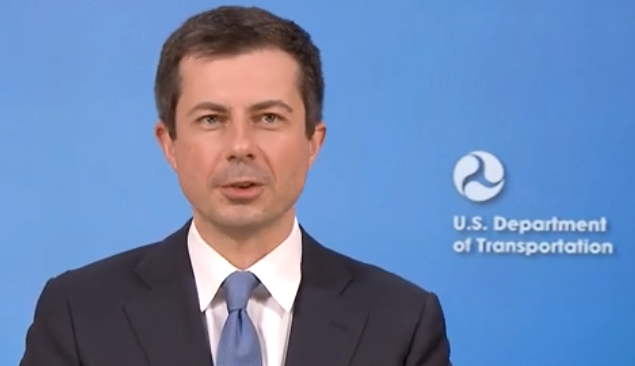The following is text of an address by U.S. Transportation Secretary Pete Buttigieg to the International Maritime Organization (IMO) General Assembly on Dec. 6:
As countries come together for the assembly of the International Maritime Organization, I want to echo the U.S. statement delivered eloquently by Adm. Karl Schultz, commandant of the U.S. Coast Guard.
The IMO has been central to addressing maritime challenges around safety, oil spill prevention, and much more. And as we look to the most pressing issues facing us all today and tomorrow, the U.S. continues to see the IMO as a very important institution.
Let me focus today on three areas we are confronting — none of which can be resolved alone, each of which requires collective action and cooperation globally.

First, climate. The very seas this industry relies on are rising and threatening lives and homes and jobs in most countries on earth. Greenhouse gas emissions from the maritime industry contribute significantly to climate change — and measures taken to date have not yet been enough to stop their growth.
That’s why the U.S. is pressing for the IMO to adopt a goal of zero emissions from international shipping by 2050, along with accelerated actions and standards to get us there.
The U.S. will do our part. At the COP26 summit in Glasgow, we were proud to join the U.K. and several other countries launching the Clydebank Declaration for green shipping corridors. The Our Ocean Conference in Palau this coming February, which the U.S. is co-hosting, is another important opportunity for all of us to raise ambition and reduce emissions in shipping. And thanks to President Biden’s Bipartisan Infrastructure Law, the U.S. is positioned to reduce the carbon emitted by our entire transportation sector.
We also believe that the shift to cleaner transportation is going to create more economic activity and good-paying jobs, and we’re backing up that belief with funding. The law invests over $17 billion to modernize our ports and waterways, including helping to electrify our ports so we can increase cargo throughput without the associated increase in emissions.
This leads me to our second point: Nearly every IMO member state is experiencing challenges with disruption to their supply chains.
This has been exacerbated by the pandemic, but it didn’t start there. With the increasing effects of climate change, unless we act these disruptions will continue to grow. As President Biden said in Italy in October, we can reduce delays and increase resiliency if we work together to make global supply chains more diverse, secure, and sustainable.
My third and final point: Our current challenges and opportunities aren’t just about ships – they’re about mariners.
These workers are truly essential to our economies, our national securities, and our futures, and they need to be respected. Equity matters. Gender equity matters. We appreciate the work that the IMO has begun to improve the inclusion of women in the maritime industry. But we clearly have a very long way to go.
And I want to emphasize one area where the need for action is particularly urgent. For too long, sexual assault and sexual harassment in maritime shipping has been an open secret, affecting the industry around the world.
Statements and commitments of zero tolerance must be backed by concrete, deliberate action. My department is working with the U.S. Coast Guard to make it easier for victims to come forward, to ensure that perpetrators can be held accountable – and, most importantly, to prevent assault and harassment from happening in the first place.
The U.S. will do our part to hasten the day that sexual assault and harassment find no safe harbor in the maritime industry. And we look forward to working with the IMO, which we believe has a key role to play in addressing this crisis — just as this institution does on so many other of our shared challenges.
I’ll end with this. When professors teach students about collective action problems, they often use as an example a body of water shared by multiple neighbors – all of whom would benefit from things like limiting pollution and improving safety on that body of water.
The nations cooperating and negotiating at the IMO can deliver a true, textbook-quality example of how to establish wise, fair rules, protections, and patterns of cooperation that make everyone better off.
That is our imperative – and our opportunity.
I wish everyone a productive assembly, and I look forward to all that we can accomplish together.
Thank you.
